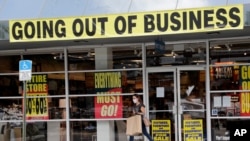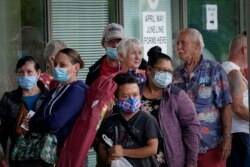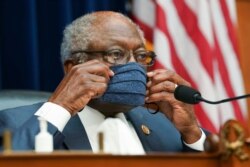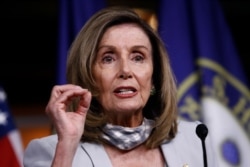Treasury Secretary Steve Mnuchin said Tuesday a second massive round of aid addressing the economic impact of the coronavirus pandemic is “still needed,” even as the U.S. economy is showing signs of recovery.
Mnuchin’s testimony comes as talks for a second round of aid have remained stalled on Capitol Hill since $600 a week in expanded federal unemployment benefits to millions of out-of-work Americans expired in late July.
Congressional Democrats have proposed an extension of those benefits, while Republicans have put forward a proposal that would cap benefits at 70% of a worker’s earnings. The overall price tag for a new round of aid has also divided lawmakers. Democrats proposed as much as $3 trillion in aid, while Republicans have called for a $1 trillion package.
Republicans and Democrats differ on the speed with which Americans should return to work while balancing health concerns, as well as markers for measuring the recovery of the U.S. economy.
“We are still very far from where we were in January when we had a record economy,” Mnuchin told the House Select Committee on the Coronavirus Tuesday.
Mnuchin said retail sales had increased for the third consecutive month in July, the housing market had returned to near pre-pandemic levels, and the leisure and hospitality industries had added 592,000 new jobs, indicating increased confidence in the economy reopening.
He noted that the numbers of unemployed Americans had not reached a threshold of 40 million as many analysts had initially predicted.
Congressman James Clyburn, who is chairman of the Select Committee, differed with Mnuchin on the unemployment numbers, saying that 29 million Americans were receiving or waiting for unemployment benefits as of August 1. He also warned that signs of recovery in the stock market did not benefit all Americans.
“The administration has claimed this partial rebound means we are guaranteed a V-shaped economic recovery, where the economy returns to full strength quickly,” said Clyburn, a Democrat. “The evidence does not bear that out. We continue to see roughly 1 million Americans file new unemployment claims every week — a classic sign that the economy remains in serious trouble. Economists have warned that we face an uneven K-shaped recovery, where the wealthy quickly bounce back to pre-pandemic prosperity, but lower-income families continue to suffer economic harm.”
Some Republicans said Democratic state governors were to blame for slowly easing restrictions that would allow businesses to fully reopen.
“The absolute best way to stimulate and grow our economy is to let people go back to work. And when it was time, the president led the charge to reopen the country, get Americans back to work and get our kids back to school,” Republican Congressman Jim Jordan said.
But Democrats say the health concerns must remain a top priority, with the government providing aid to fill the gap.
“It’s long past time for Republicans and President (Donald) Trump to stop following the returns from Wall Street and wake up to the problems of Americans living on Main Street,” House Speaker Nancy Pelosi and Senate Minority Leader Chuck Schumer said in a joint statement Tuesday.
They noted Sept. 1 is the day when rent is due for millions of Americans and continued to say, “Republicans must join House and Senate Democrats to respond to the growing need by doing everything in our power to keep families healthy, safe, and secure — in their own homes.”
The White House announced Tuesday the Center for Disease Control and Prevention and the Department of Health and Human Services would use their quarantine authority to halt evictions on all renters who meet certain criteria.
“Today's announcement from this administration means that people struggling to pay rent due to the coronavirus will not have to worry about being evicted and risk further spreading, spreading love or exposure to the disease due to economic hardship,” Brian Morgenstern, deputy press secretary, said in a press call with reporters.
Last month Trump extended $400 a week in enhanced unemployment benefits through executive action after the Republican-majority Senate and the Democrat-majority House of Representatives failed to reach a deal on aid.
Lawmakers will return to Capitol Hill following the Labor Day holiday weekend and are expected to tie any deal for coronavirus relief to a bill extending government funding past a Sept. 30 deadline.



